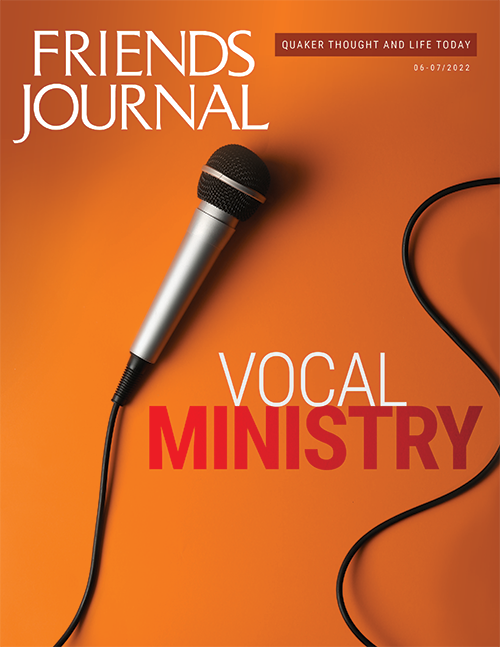Staying Centered in the Occasional Bedlam of a Busy Meeting
Friends, being human, have their foibles. It is in spite of this—or perhaps because of this—vocal ministry that emerges in unprogrammed meetings manages to shine through all of the unwritten rules: don’t speak more than once; don’t directly respond to another; have your message come from the heart and not the headlines; keep it clean.
Wait until you are compelled to speak by the Spirit.
I am a frequent speaker in meeting for worship (which will surprise no one who knows me). I was born with a desire to tell stories and an ability to speak in public and to coin phrases that make vocal ministry very much a part of my worship experience. Because of the ease with which I can speak, I have learned to temper myself: I wait until I am literally standing without conscious thought before I tell the story I want to tell. I wait until I am compelled to speak by the Spirit.
I have one more unwritten rule that Friends may be surprised to hear. I remember what I was told by Friend Barbara Nnoka one First Day as we sat chatting (well, gossiping really, in a Friendly way) in the assembly room of Friends Meeting of Washington (D.C.). She said, “There are people in meeting that when they stand—before a word comes from their mouth—I wince.”
Whenever I think about speaking in meeting for worship, I wonder who will wince the moment I stand. I am sure they are there among my Friends, even when many will later tell me how my message spoke to them. When I sit down after a message, I think again about who winced.
I am reminded of the apocryphal story about John Woolman in what he thought was an empty meetinghouse rising to give an impassioned message about the evils of slavery. He was overheard by the largest Quaker enslaver, who was outraged by the message and felt that surely he was its target. Woolman reputedly replied, “God gives me the words to speak. I leave it to God to find the ears to hear.”
I do not take it personally that some wince at the sound of my voice. It has been clear to me for a long time that the message in my heart is different from the one that leaves my lips; still different from the one that reaches your ears; and, finally, different from the one that reaches your heart. My message is always transformed by its hearers, including me. I often sit after speaking and meditate on what I actually said rather than what I had intended to say.
The message in my heart is different from the one that leaves my lips; still different from the one that reaches your ears; and, finally, different from the one that reaches your heart. My message is always transformed by its hearers, including me.
Having traveled among Friends for more than a decade, I know that there are those, especially in programmed meetings and Friends churches, who feel that the ability for anyone to speak without regard to their connection to the meeting is fraught with peril.
Unfortunately, it is true that there are those who come to Friends meeting not to seek a spiritual community but to find a platform for their issues. The word is out that anyone can speak in Friends meetings, and people come for just that reason: a captive audience. Some meetings are more likely to experience this than others because of their size or location. Being near a university can make a meeting more likely to attract intellectual messages, for example.
Friends Meeting of Washington (D.C.), my spiritual home for more than 40 years, is a frequent location for such ministry because it is located in the nation’s capital. We get people giving political messages (including a woman and her Native American companion who spoke about her running for president on the Native American and All Good People Party ticket). We have received messages coming from deep pain and confusion, including one from a woman who began to scream that red was the devil’s color and ran toward a frightened mother whose daughter on her lap was wearing a pretty red dress.
I know some Friends recoil at the prospect of such a free-for-all. I cannot say that I look forward to such vocal ministry, but I can say that I have benefited from it nevertheless.
I recall the first time I sat at the head of meeting, a position which means I presided over the worship that day. I felt honored. Unfortunately, that was a day when a regular attender in mental and emotional pain started with a moving message that deteriorated into a rant about the American secret police. Friends began the practice of what I call “Bop-A-Quaker” (named after the arcade game Bop-A-Gopher), and one Friend in particular glared at the attender giving the ministry. And it was a great glare. The attender glared back and said that he had been about to sit but could stand in protest just as long. People continued to rise to stand, and it was impossible to tell who was standing in support of which position. I was flummoxed as this was my first experience with a hostile standoff in meeting. I babbled something to no effect.
Then an elder in the meeting, Ellis Williams, stood. He began to pray in a very quiet voice that I could barely hear. The tension in the meeting room began to dissolve, and one by one everyone except Ellis sat down. He stood a few more moments in silence and then sat down in a very gathered meeting. I was in awe at the love and peace that filled the room at that moment.
Some months later, we were visited by another person who sought to use the meeting as a podium. As the angry Bop-A-Quaker began again, I felt called to try to bring that centeredness to the meeting I had witnessed before. But I did not have a call to vocal prayer; I was called to sing. And the meeting sang until the anger left. The podium was dismounted, and sacred silence was restored.
And that became the custom in Friends Meeting of Washington: to sing “Amazing Grace” to bring worship back to centeredness whenever someone attempts to use the meeting for personal ends. I recall one frequent visitor who told me how he was impressed by the dual goals of not letting others take over the meeting for worship for their own agendas and the meeting choosing not to use demands or aggression to take the meeting for worship back to where it belonged. He said he never felt more at peace than when the meeting used song to take back worship.
Yet another attender claimed the singing was aggressive and violent. People have stopped coming to Friends Meeting of Washington just to avoid the behavior of interlopers. They seek quieter meetings: ones with little vocal ministry.
If I can hear the voice of God in the cries of the hurt and angry ministry, then I believe I have a chance to really hear God’s voice in the peace of a meeting that has righted itself after the chaos of those who come with their own agendas.
I remember coming to meeting alone during the time my husband, as a young man, began to struggle with losing his hearing. He was a criminal trial attorney, and his hearing was a critical tool of his trade. The stress from fearing he would no longer be able to follow his calling resulted in strain in our marriage. I came to meeting to seek silence, centering, and relief from the stress.
That was the day a man named Thomas came to meeting to tell us we should go with him to leap the White House fence and demand peace. No one spoke when he sat down. He rose again and argued that Friends had a reputation for seeking peace. Why weren’t they rising up with him in his quest? He sat down again. Only silence as a response. He began to sing loudly, “O come let us ignore him. O come let us ignore him.” And then threw himself back in his seat angrily.
I rose and spoke of how I had come seeking silence and peace, but instead, I was reminded of the story of Elijah when he was in despair and threw himself into the wilderness seeking God. He witnessed winds that moved boulders, an earthquake that made the mountain tremble, a fire that roared and destroyed, but God was not in any of those powerful forces of nature. Elijah heard something else: a still, small voice. Friends often speak about the still, small voice but rarely recall that it was heard when the forces of nature did not carry it.
And that is why I would never exchange the occasional bedlam of an unprogrammed meeting and its spoken ministry, even when the intent of that ministry is something other than spiritual. Because if I can find that of God in everyone who speaks in meeting, if I can listen to messages and take what is meant for me and trust God to find the right ears to hear them when mine are not, if I can hear the voice of God in the cries of the hurt and angry ministry, then I believe I have a chance to really hear God’s voice in the peace of a meeting that has righted itself after the chaos of those who come with their own agendas. The still, small voice still speaks: out of the quiet and out of the chaos. Sometimes it is for others and sometimes, when I am lucky, it is for me. And for that, I am grateful, and I will never let it go.




What about the meeting with no occasional bedlams, but rather with constant and exclusive speaking about environmental degradation, racial inequality, the beauty of nature, the passing of Tich Nach Han, police brutality, and politics? All of these are worthy topics for discussion and action. But when they result in excluding God from worship, then there is a problem.